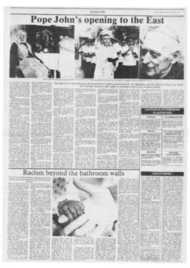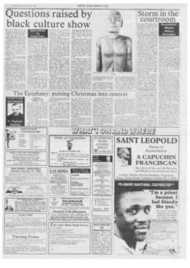Page 5, 5th January 1990
Page 5

Report an error
Noticed an error on this page?If you've noticed an error in this article please click here to report it.
Tags
Share
Related articles
Pope John At Requiem
New Papal Secretary Of State
Newman Bust For Pope John
A Look Of Peace Was On His Face
Cardinal At 'stuart' Cathedral
Pope John's opening to the East
IT was 11.30am on the morning of November 25, 1961, Pope John XXIII's 80th birthday, when the Cardinal Secretary of State Amleto Cicognani knocked at the door of the private papal dining room. The cardinal was "all of a twitter" as the Pope would relate afterwards, and he handed John a birthday greetings telegram:
"Congratulations and sincere wishes for your good health and success in your noble aspiration to help reinforce and consolidate peace on earth." It was signed Nikita Kruschev.
Cardinal Cicognani confessed he was scandalised at the Soviet Supremo's "nerve" but for John XXIII, it represented "a thread of Providence that I do not have the right to break".
"We mustn't hurry, however. These things have to mature. Meanwhile, let's go on with goodwill and faith", he said.
The Vatican's Ostpolitik had begun. 28 years later it would bring a Soviet leader and Communist Party Secretary face to face with a Pontiff in the Vatican, would re-open negotiations for full diplomatic relations between two arch enemies, and prepare the way for a papal visit to the Soviet Union.
John Paul II, instrumental with Mikhail Gorbachev in forcing the historic turning point in East-West relations this year, would also speak of "Providence" — that a Polish Pope would rezeive the Communist Party Secretary and leader in the Vatican, that the Polish Church would serve as a lever, that Polish Catholics would be the first to openly rebel against their regime, that reform in a Polish-Soviet Republic, the Ukraine, would be the underlying condition for change.
Back in 1961, John XXIII was preparing Vatican Council II, to be opened in October the following year. To ensure that Russian Catholicism would send representatives, he secretly arranged for the "providential" thread to be strengthened, not in Rome or in Moscow or even in other eastern bloc capitals, but in Ankara, Turkey, a religious crossroads.
In the spring of 1962, he asked his Nuncio to Ankara to visit the Russian ambassador and request his intercession with Kruschev on the bishops' permits to visit Rome for the Council. The ambassador told Nuncio Archbishop Francesco Lardone that he admired John XXIII and suggested he send the invitations in his own diplomatic bag.
Archbishop Lardone, spurred by such courtesy, toured other eastern bloc embassies, stressing that the Russian bishops' invitations had gone in the Soviet Union's diplomatic bag. The revelation had the desired effect.
In the Vatican, the Cardinal Secretary of State Cicognani was still "in a twitter". He was peeved that the Pope had told him nothing of the Nuncio's mission in Ankara and indignant at pontifical conniving with the Russians which, in 1962, resulted in a Christmas greeting from Kruschev to the Pope.
Pope John ignored the protest and in March 1963, he received Kruschev's daughter, Rada, and her husband at the Vatican.
A month later he woke up one morning with another of his ideas. He personally telegrammed the Vatican's Under-Secretary for Extraordinary Ecclesiastical Affairs, Archbishop Agostino Casaroli, in Vienna for a United Nations conference. "Go to Budapest, then Prague", was the tall order.
Casaroli, now the Cardinal Secretary of State who has personally forged the Vatican's bridge to the East over the past decade, set off on his lone mission for talks with the persecuted primates of Hungary and Czechoslovakia. Cardinal Casaroli often tells the story today of his first Ostpolitik adventure — in Prague, he communicated with the Primate Archbishop in writing across a table for fear of spy-bugs in the prelate's home where he was under house arrest.
In 1988, on the 25th anniversary of that adventure, the cardinal became the first direct papal representative to cross the threshold of the Kremlin.
On May 16, 1963, Casaroli returned to the Vatican to find John XXIII seriously ill. Five months before his death, on June 3, the Pope had written in his diary for December 26 1962 that he was prepared to make the "extreme sacrifice" for Russia's conversion. "God is mysteriously at work. Might it be possible that this Kruschev is reserving some surprises for us?"
Under Paul VI, ostpolitik was formalised to a degree. On October 4 1965, he shook hands with Soviet Foreign Minister, Andrei Gromyko at a UN General Assembly. Nearly two years later, he received Gromyko at the Vatican and on January 30 1967, he granted what was called a "working audience" to Soviet President, Nicolai Podgorny.
The titular head of state, according to another of Cardinal Casaroli's anecdotes, was trembling with nerves when he came face to face with the Pope in the papal library. But the sometimes austere, aristocratic Paul VI, a marquis by birth, immediately eased the tension. "Have a cigarette". he said, offering the 40-a-day Podgorny a decorative box full of the guest's own brand.
At the time, some members of the College of Cardinals let it be known that they were opposed to Paul VI's meetings with Gromyko, Podgorny, and later in 1971 with President Tito of Yugoslavia. They described the audiences as "hand-shakes with our persecutors".
Since 1917, when religion in Russia became the people's opium, the Church has been the victim of constant repression, reaching a peak in the second half of the 1940s.
In the Ukraine, 3,600 priests were condemned to death and over 1,000 were assassinated or jailed in Lithuania, Estonia and Latvia. Czechoslovakia imprisoned more than 500 priests. In Hungary, 540 were killed, jailed or deported, 710 were persecuted in Romania, 120 arrested and exiled from Bulgaria and in Yugoslavia, just across the Italian border, 1,950 priests vanished, either killed or forced into hiding.
In his 1951 Christmas message, Pius XII called the Church in the eastern bloc the "Church of Silence".
Silenced, too. were its leaders. In 1945, Archbishop Josyf Slipyi of Leopoli in the Ukraine was deported to Siberia. In 1946, Archbishop Alojzijo Stepinac, Primate of Croatia, was sentenced to 16 years' hard labour. Three years later, the Hungarian Primate, Cardinal Josef Mindszenty was condemned to death, later commuted to life imprisonment. The same year, the Czech Primate Archbishop of Prague Jozef Beran was placed under house arrest and would remain a prisoner in his own home for 13 years.
One of the "persecutors", Gromyko, returned to the Vatican five times, for three more audiences with Paul VI and two with John Paul 11.
Today, the Kremlin is waiting to welcome John Paul II in 1991, a result of this ecclesiastical and communist paving of the ways for Gorbachev's visit to the Pope, historically more significant than previous "handshakes" with the Devil because the Soviet leader is also Secretary General of the Communist Party.
Blocking the carefully laid road to Russia is no longer the shredded Iron Curtain but a small parish church "of the Transfiguration" at Lvov, the provincial capital of western Ukraine.
On October 29 this year, it became the bastion of Catholicism in the Ukraine, a former Polish territory converted to the faith in 1596. Stalin, after annexing the territory to the Soviet Union and Catholicism to Orthodoxy nearly four centuries later, forced Ukrainian Catholics underground. Their 4,000 churches lost to them, the majority practised Orthodoxy in the open but remained secretly faithful to Rome.
Two months ago, a celebrant priest interrupted a packed Orthodox service and announced he was Catholic. The congregation, without dissent, also declared themselves and elected to "occupy" the church. Within days, about 20 other priests and hundreds of faithful from all over the region joined them and by the end of November, an estimated 1.10 Ukrainian Catholic-turnedOrthodox parishes had become publicly Catholic again in defiance of both State and Orthodoxy.
Following Gorbachev's talks with John Paul 11, the Soviet Union has promised new religious liberty laws and a census of Ukrainian Catholics. Orthodoxy has already reshuffled its hierarchy, removing staunch anti-Romanists and replacing them with younger, less reactionary prelates.
In exchange, John Paul will not insist that exiled Ukrainian priests be reinstated in the Republic, will advise Lithuanian separatist movements against further campaigning, and will implicitly recognise the Bielrussian frontier edging Poland, "adapting" diocesan borders accordingly.
Within the Vatican, several intriguing theories have emerged on this year's unexpected tide of events.
A popular notion is that détente was accelerated to waive the doom prophesied in the socalled "Secrets of Fatima", given to three Portuguese children at the turn of the century during an officially recognised Marian vision. Only popes, on their election, are permitted to read the secrets, two of which are believed to warn of world wars.
The third is thought to stress the need for Russia's conversion, reflected in several papacies. Pius XII twice consecrated Russia to the "Madonna of Fatima", John XXIII his own life and John Paul II has "entrusted" the world, and "Russia in a special way" he said in 1987.
A more light-hearted observation has been that the mothers of many of Ostpolitik's protagonists over the decades should have the credit. In 1962, when John XXIII's Nuncio visited the Russian ambassador to Ankara, the diplomat confessed that his mother was a "fervent church-goer". Stalin himself ordered that a church in Georgia be allowed to function without harassment because his mother, who lived there, had asked him the favour. And Gorbachev admits his mother accompanied him to church regularly as a child, although he remains, he said in Rome, a "non -practising atheist".
blog comments powered by Disqus











